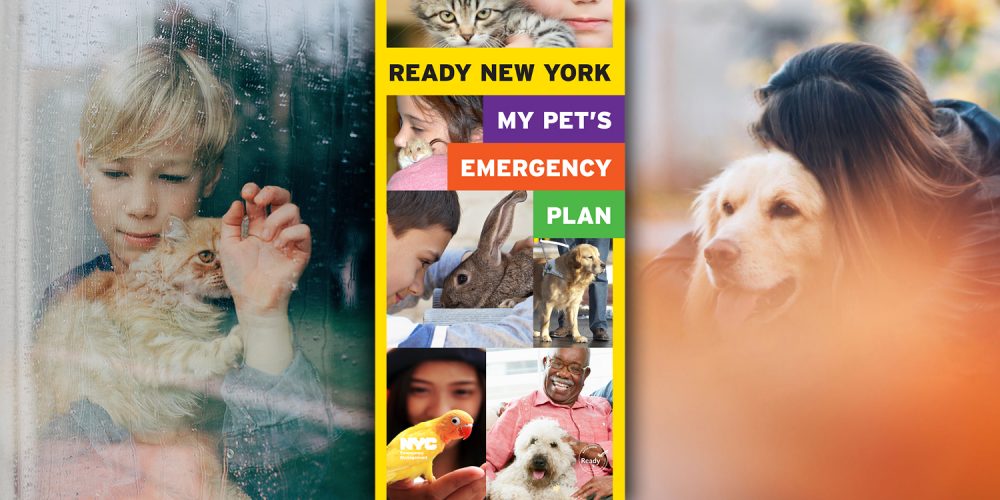
The upcoming anniversary of Hurricane Ida’s deadly assault on New York City and the surrounding area in 2021 is a stark reminder of how vulnerable we are when confronted with extreme forces of nature. This year’s litany of environmental disasters in the US alone – storms, floods, extreme temperatures, and wild fires, among others – signals how more than ever we need to be prepared for the unexpected.
As we move into peak hurricane season, it’s important that everyone have a plan for weathering the perils that could lie ahead. For pet owners, advance planning is perhaps even more critical than ever before.
Ready New York: My Pet’s Emergency Plan is a workbook that outlines important steps pet owners can take to ensure their pets are prepared for all types of emergencies. The workbook, as well as other valuable NYC publications that provide guidance in emergency preparedness, can be viewed online in a range of languages.
For a quick review of actions pet owners can take to prepare for emergencies, we hope you’ll visit https://www1.nyc.gov/site/em/ready/pets.page. Topics ranging from proper identification for pets, evacuating with pets and service animals, transportation options, how to prepare for a scenario in which you’re unable to get home to be with your pet or service animal, how to prepare them for weather or health emergencies, and what supplies to gather for your and your pets’ Go Bags are all addressed in this easy-to-follow summary.
In September – National Preparedness Month – NYC Emergency Management (NYCEM) will present its annual Pets and Service Animal Preparedness Fair. Designed to raise awareness specifically about emergency preparedness involving pets and service animals, the event will take place on September 15 in Union Square Park’s North Plaza, from 11:00 AM – 3:00 PM. The fair will showcase the resources that city and non-profit organizations provide to ensure the safety of pets and service animals prior to and during emergencies. Service animal organizations will also be present to educate the public about the role of service animals and how they assist people with disabilities. Admission is free to all.
As a member of NYCEM’s Animal Planning Task Force since 2006, the Alliance has worked with the City of New York and numerous task force partners over the years to create and implement a comprehensive plan to keep New Yorkers and their pets safe when disaster strikes. A cornerstone of New York City’s emergency response plan is that in the event that the City’s emergency shelter system is opened, pets are allowed at all City evacuation centers.
To arm yourself with more valuable preparedness information, visit our Prepare Your Pets for Emergencies page for links to a range of expert sources, including American Red Cross, American Veterinary Medical Association, ASPCA, Department of Homeland Security, FEMA, Humane Society of the United States (HSUS), RedRover, and others.
On a final note: why microchipping your pets is essential.
During an emergency, the likelihood that you and your pets will become separated is extremely high. Having your pets microchipped is one of the best ways to increase their chances of being reunited with you. To be effective, however, you MUST register the microchip with a microchip registry, and update your contact information whenever you change your address or phone number. Read more about microchipping your pets.
A registered microchip is extremely important as a permanent means of identifying your dog or cat. But we also recommend having a dog tag affixed to your dog’s collar that displays your current phone number. If your dog is found running loose, a Good Samaritan can quickly call you and let you know your dog has been found and make arrangements to be reunited with you.
If you need more encouragement to microchip your pets, please watch this video.


